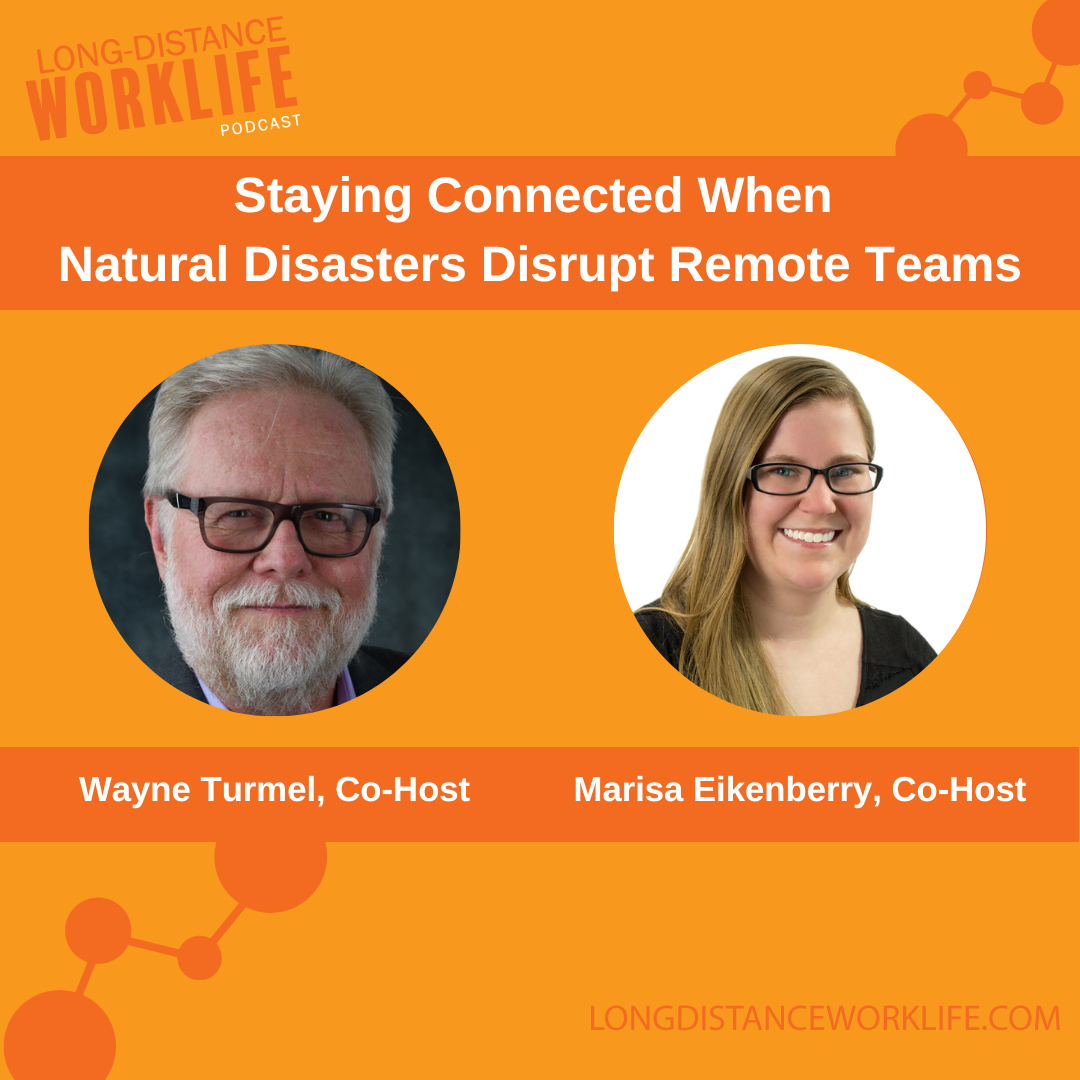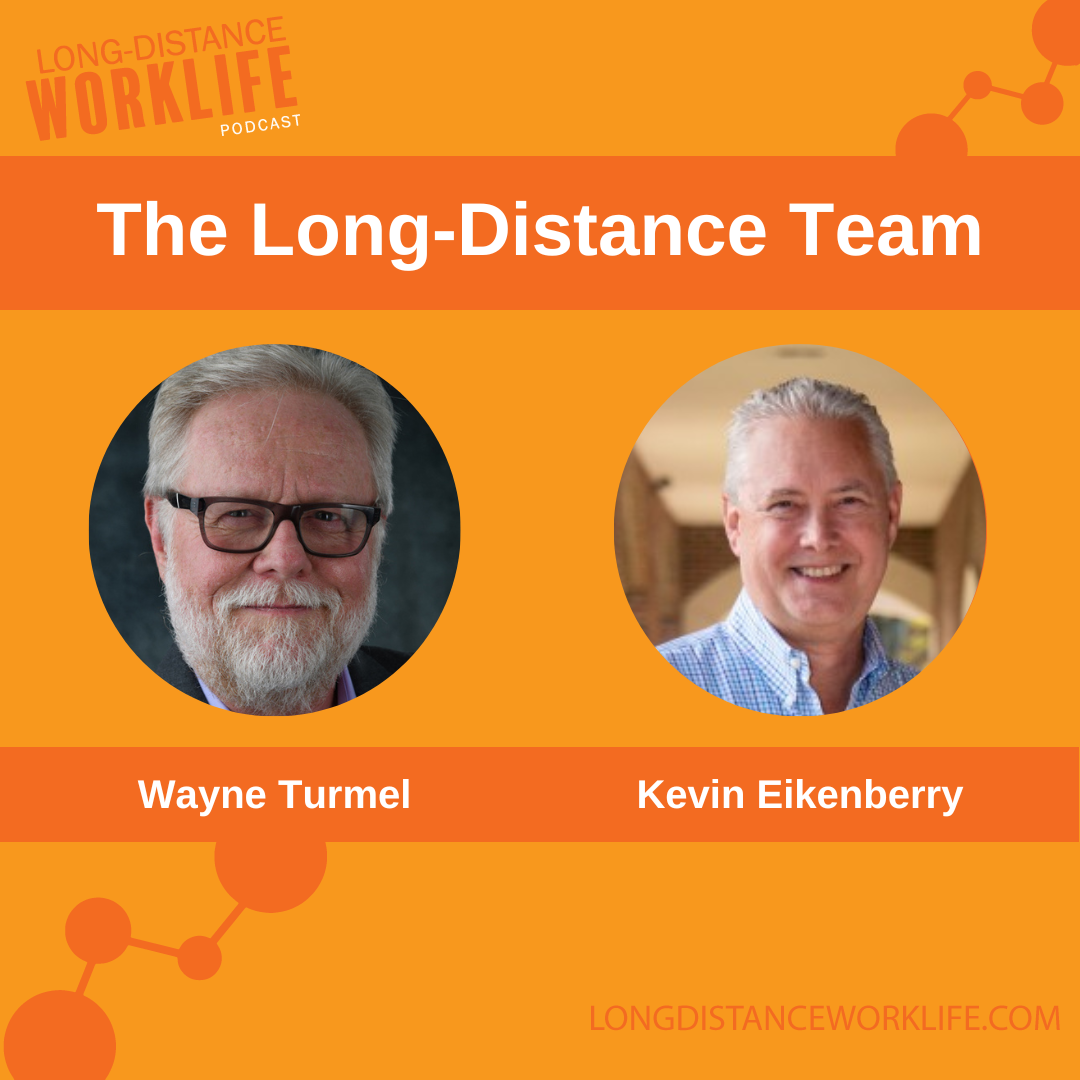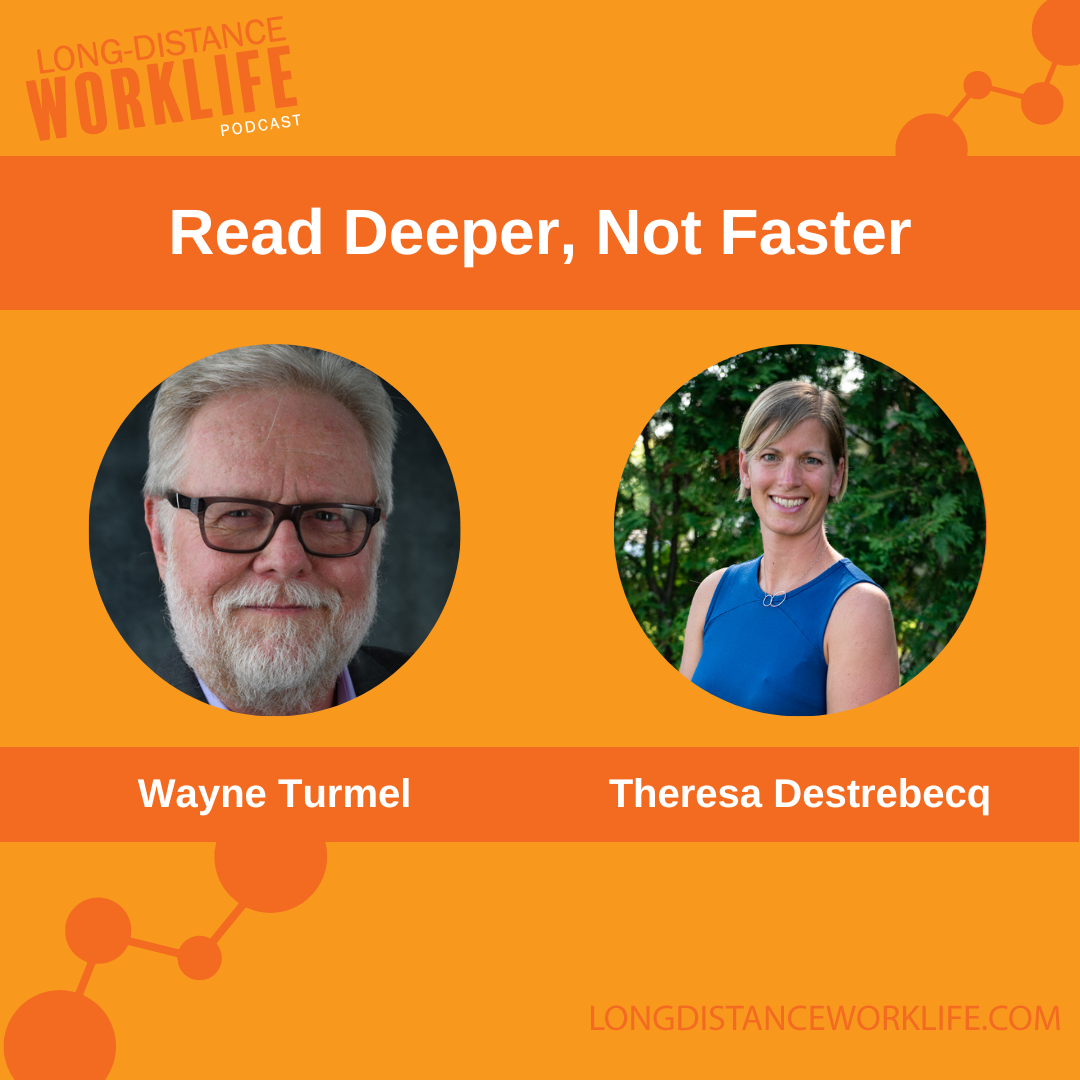Working remotely can come with a lot of isolation and loneliness. But Ryan Jenkins, author of Connectable: How Leaders Can Move Teams From Isolated to All In tells us that loneliness isn't defined by the absence of people, but the absence of connection. Ryan joins Wayne to discuss ways that leaders can help their team members can feel more connected even when working remotely.
Additional Resources
- Learn more about Ryan Jenkins
- Connect with Ryan Jenkins on LinkedIn
- Order Connectable: How Leaders Can Move Teams From Isolated to All In by Ryan Jenkins on Amazon
- Learn more about Wayne Turmel
- Email Wayne Turmel
- Purchase a copy of The Long-Distance Leader
- Purchase a copy of The Long-Distance Teammate
- The Kevin Eikenberry Group
Free Video Series!
Join us for a powerful, 4-part video series titled, Demystifying Remote Leadership. You will learn how to create solid working relationships in a virtual team with more confidence and less stress!
00:00:08:03 - 00:00:38:05
Wayne Turmel
Hi everybody. Welcome back to the Long-Distance Worklife Podcast, the podcast where we try to help you figure it out, thrive, survive, generally keep the weasels at bay in this crazy world of remote and hybrid work. And today I am really, really excited. My name's Wayne Turmel by the way. Melissa is not with us because we, in fact, have a fabulous guest who I'm going to bring in right now.
00:00:38:11 - 00:00:54:23
Wayne Turmel
Ryan Jenkins is the coauthor. And as a coauthor, I'm very sensitive to making sure people get their credit. He is the coauthor with Steven Van Cohen of Connectable How Leaders Move Teams From Isolated to All In. Brian Jenkins is with us. Hi, Ryan.
00:00:55:14 - 00:00:56:13
Ryan Jenkins
Hey, Wayne. Thanks for having me.
00:00:57:10 - 00:01:08:21
Wayne Turmel
Thank you for being had. Here's the deal, by the way. I just realized I called Marisa Melissa a moment ago, so just, you know, clear it up.
00:01:08:22 - 00:01:10:00
Ryan Jenkins
My man got it cleared up.
00:01:10:18 - 00:01:20:04
Wayne Turmel
It's kind of like working in the kitchen. Ryan, I first of all, the book is terrific. For those of you who haven't read Connectable, please. Please do.
00:01:20:12 - 00:01:20:21
Ryan Jenkins
Thank you.
00:01:20:22 - 00:01:47:19
Wayne Turmel
But I was interested that you spent a whole lot of time on something that I think is really important and doesn't get a lot of conversation, which is this idea of loneliness at work and maybe you can help. It's always good to define terms. Maybe you can help us. What is the difference between loneliness and being alone? Because a lot of us actually kind of dig being alone to get our work done and whatever.
00:01:47:19 - 00:01:50:19
Wayne Turmel
But lonely is different. Let's start there.
00:01:51:20 - 00:02:17:01
Ryan Jenkins
Yeah. Great. Thanks for having me. Weigh in and look forward this conversation. I'll take it one step back. I won't answer your question, but I think it's important for folks to understand that loneliness isn't defined by the absence of people. It's defined by the absence of connection. So we, you know, viewers and listeners can probably relate. You've been in a crowded room at times and still can feel a sense of loneliness or disconnection because you don't have you don't connect with those people.
00:02:18:16 - 00:02:39:10
Ryan Jenkins
Same is true if you're working remotely to where if you're connected to the work, the your team members, your leader, you might not have the same strong sense of loneliness or isolation. Then that person in that room full of people did. So it's not predicated on that. The absence of people is the absence of connection. And then if you think of this idea of isolation, isolation really isn't positive or negative.
00:02:39:10 - 00:03:00:23
Ryan Jenkins
The negative state of isolation is loneliness. The positive state of isolation is solitude. And we talk at length in the book about how solitude is kind of this is the first defense. It's insurance against isolation or against loneliness. Excuse me, because think of I get back to the definition. It's not the absence of people. It's the absence of connection.
00:03:01:04 - 00:03:24:15
Ryan Jenkins
And one of the strongest connections we all have to have is that connection with oneself. And that can actually be had during solitude, where you're actually free from the inputs of other minds. So again, isolation is not positive or negative. The negative state is loneliness. The positive state is solitude. And of course, nowadays we're experiencing more heightened levels of loneliness for a myriad of reasons that we might go into.
00:03:24:21 - 00:03:42:01
Ryan Jenkins
But to your point alone, you can be alone, like in solitude, and not experience the negative state of loneliness. But loneliness is the negative state where you're having those negative emotions, where your mind and your body are actually in a fight or flight state because we're prone, we're vulnerable when we're alone or lonely.
00:03:42:22 - 00:04:04:06
Wayne Turmel
You know, this notion of loneliness seems like an odd discussion to be having when it comes to business, but it's actually been part of the conversation for a while. There was a very famous essay in a book in the late nineties called Bowling Alone that basically said we were becoming more and more separated from each other socially. Disconnect.
00:04:05:10 - 00:04:34:01
Wayne Turmel
And, you know, and then that was pre-Internet, you know, when that happened. And then the Internet happened and then all of a sudden there was COVID and we were really, really pushed, pushed out. What impact why do business people care about loneliness? I mean, this sounds like it's my me problem, not a new problem. Yeah. You know, why is there a business issue here?
00:04:34:22 - 00:04:57:00
Ryan Jenkins
The healthiest organizations balance high performance and worker well-being. You've got to balance both of those. You can't totally focus on high performance and sacrifice the well-being of your team because that results in burnout and high turnover rates. And you can't focus completely on worker well-being and cater to everyone's whim because then you're not delivering for the market or your customers or clients and you go out of business.
00:04:57:10 - 00:05:29:03
Ryan Jenkins
So you got to find this balance. And why it's important to address loneliness is because both ships rise. In that case, when you when you address loneliness, not only does worker well-being improve, but performance improves as well. So a good way to think about it is when we they've done research to when we experience exclusion, someone feels a sensation of exclusion, the same part of the brain that registers physical pain actually registers when we experience exclusion because again, our body is in a fight or flight state when we feel lonely or excluded.
00:05:29:18 - 00:05:52:13
Ryan Jenkins
So if that's the case, that's as if we're showing up to work with a bleeding appendage and we wouldn't want anybody to tell us, hey, go ignore that bleeding appendage and get to work. Well, you're not to be able to focus. We're distracted at best for debilitating that worse. Same thing is true with these invisible ailments. And we're so glad that the conversation around mental health at work is, is, is, is growing because it's so important.
00:05:52:21 - 00:06:10:22
Ryan Jenkins
But I think if we can solve for loneliness, if we can create connection, everything else flows from that. We're going to we're going to see less burnout, less stress at work, anxiety languishing. Because we are wildly, all of us, all of humanity. I'm convinced after three years of studying it, we are wildly underestimating how much we need human connection.
00:06:11:05 - 00:06:22:18
Ryan Jenkins
And there's so many things that are our life now where we're it's keeping our loneliness levels at a manageable level and we're just doing enough communication when we're not actually connecting.
00:06:23:23 - 00:06:52:18
Wayne Turmel
There are about three things that you just said there that I want to put pins in. One is that our research certainly shows that one of the number one problems in remote and especially hybrid teams is exclusion. That and it's not always a oh, we don't want to play with Ryan in the sandbox. It's we're literally not thinking about Ryan because he's out of sight and out of mind.
00:06:53:14 - 00:07:26:15
Wayne Turmel
And of course, if you are an introvert by nature or you're new to the team and you don't have the existing relationships, exclusion is a very real thing. The second thing that you said is kind of tied to that, which is, you know, we part of engagement is do you have a friend at work? And when they measure employee engagement, right, that's always one of the main questions.
00:07:26:15 - 00:08:00:18
Wayne Turmel
Do you have a really good friend at work and more and more the answer is kind of no. And one of the reasons for this, I think I'm getting to a question, one of the reasons I think is that two thirds of the social interaction that we get for the week traditionally has taken place through our work. If you remove that or greatly reduce the amount of social interaction that you're getting at work that has an impact on everything else.
00:08:00:18 - 00:08:16:06
Wayne Turmel
So what can we I guess there's an organizational level, there's a team level and there's an individual level. Let's start with the individual level. What do we do to avoid loneliness at work as individuals?
00:08:17:19 - 00:08:39:14
Ryan Jenkins
Yeah, the first step and so much of this to overcome all this is awareness. You know, you think about how long we had automobiles before we actually put in seatbelts, right? I think it was like 50 years with the automobile before. It takes us a long time to kind of wrap our heads around some of these these, you know, new age challenges and then to implement something.
00:08:39:21 - 00:08:57:18
Ryan Jenkins
But so often, you know, if you ask a psychologist, they would tell you you got to name it before you can tame it. And so we've got resources for folks can actually identify the loneliness levels in themselves empirically validated to figure out where am I at with this? And again, this is a universal human condition, so there's no shame in loneliness.
00:08:57:19 - 00:09:19:23
Ryan Jenkins
It's literally our biological cue that we belong with each other and we all experience it differently. It could be situational, it can be relational. There's all different aspects that can kind of lead to loneliness. But the biggest first step is to just start kind of being more aware of it and try to find, you know, what are your personal loneliness levels when and where do you experience it?
00:09:20:06 - 00:09:30:08
Ryan Jenkins
And then just try to find pro-social behaviors, just one or two pro-social behaviors each day that kind of pull back and nurture your connections in your.
00:09:30:08 - 00:09:54:00
Wayne Turmel
It's a paradox to that, though. What I'm hearing is absolutely right, which is you need to be proactive, right? The more drive you need to be proactive. The challenge is when you are truly lonely. Along with that comes depression and self-loathing and all kinds of lovely things, which of course reduce your desire or ability to reach out and be proactive.
00:09:55:14 - 00:10:26:00
Ryan Jenkins
You are right, my friend. Yeah, exactly. So we tend to turn inward, which is the exact opposite of what we should be doing. So it's really hard for us individually to tackle loneliness. All of us should just assume that we are prone to loneliness and consistently keep yourself in community with others. And then the second tier that you talked about around team or community, that's what's really important because we need to be aware of these disconnection or isolation or loneliness signs of those around us because it does take us.
00:10:26:00 - 00:10:47:01
Ryan Jenkins
It takes a community to pull folks in when they might be slipping away, because you can't just you can't just do it yourself. If it was as easy as telling a lonely person to go get a pet or go to a happy hour, this wouldn't be a problem. Right? So it's way more complex than that. And I'll give you one tip as it relates to kind of this team or community.
00:10:47:01 - 00:11:13:09
Ryan Jenkins
And we research we didn't research. We we interviewed Steve Cole, who's out of UCLA, and he studies loneliness at the molecular level, which is extraordinarily fascinating. And he talks about there's a trap door in connecting with someone that's experiencing severe levels of isolation or loneliness because and he says, trap door to your point to where folks, when we're experiencing loneliness, we turn inward and we distrust everybody else.
00:11:13:10 - 00:11:32:13
Ryan Jenkins
It can be really hard to connect and pull folks in, which is why we all have to be more open and proactive about all this. But Steve Cole says the trap door is four words. And before I give you those four words, I'll tell you little bit of the science behind this. So when we when our when our bodies experience some type of threat, the threat circuitry in our brain lights up.
00:11:32:13 - 00:11:50:15
Ryan Jenkins
And that's when we go into flight or fight state of a fight or flight stage. And so good examples of that building of buildings on fire. Your threat circuitry is high and you're running away from that threat. Same thing happens when we're experiencing loneliness. We feel there's a threat. And so we run away from it. We're running away from people.
00:11:51:03 - 00:12:11:07
Ryan Jenkins
But the way we can get around that is through meaning. So, for example, if that, if the if the building is being on fire, normally you'd run away from it. But if you have something meaningful in that building, such as a child, you might you're going to you're going to you're going to overthrow that threat circuitry and you'll run into that building when there's some type of of meaning there.
00:12:11:15 - 00:12:31:20
Ryan Jenkins
And so what Steve Cole suggests to pull people out of loneliness and isolation is four words I need your help. So it's pulling people. It's trying to attach more meaning and trying to help people see that the contribution that they're that they bring to the table they bring to the team is useful because that's, you know, back when we roamed the plains, our ancestors roamed the plains.
00:12:31:20 - 00:12:53:18
Ryan Jenkins
If you weren't contributing to a tribe, that meant you were vulnerable to getting excluded. And when you were excluded, there was all kinds of things that would it could eat you or kill you. And so we have this innate desire and survival tactic to actually want to contribute. And sometimes it takes other people around us to show us what that unique contribution that we make is.
00:12:54:22 - 00:13:18:13
Wayne Turmel
As a leader, assuming you yourself are functional and grounded and able to have peripheral vision about this stuff, what should a leader be looking for? Signs that somebody is disconnected to the point of loneliness, for lack of a better term?
00:13:19:13 - 00:13:45:06
Ryan Jenkins
Yeah, there's there's there's a lot of we've identified ten indicators. I'll just give you a few of them. One of them is, is excessive working. Right. That can be a way. So if you start seeing emails late in the evening, early morning, just around the clock working, that could be a way for people to not be not want to step into some of their interpersonal or relational priorities at work in life.
00:13:45:06 - 00:14:13:08
Ryan Jenkins
So excessive working can be one an apathetic attitude, a change in routine is also a good indicator. So if you could if you could get a sense of the kind of the cadence and routine of your team, so when that breaks that that's an indicator. And then just kind of a lack of learning in development, someone that doesn't want to engage in career progression conversations or isn't learning, not really adapting to a growth mindset and wanting to better themselves, that can be an indicator as well.
00:14:14:17 - 00:14:41:23
Wayne Turmel
And as we promised, we get to the organizational level too. And this seems like a harder thing to get our minds around because organizations can organize events and, you know, you can bring people in once a year and you can have virtual happy hours and whatever the heck else they're organizing. What really meaningful things can organizations do?
00:14:41:23 - 00:15:04:09
Ryan Jenkins
Yeah, we've seen something that's been really helpful is peer coaching. So organizations that create environments where people can can connect at a very deep level, but also have it be meaningful to the organization. So peer coaching is found to be really, really helpful. And that's exactly what it sounds like is having two people coach each other. And there's no there's no kind of hierarchy to it.
00:15:04:09 - 00:15:30:12
Ryan Jenkins
It's just, hey, we're going to wade into each other's lives and talk a little bit personal, a little bit about work and alternate, who who's helping who. That can be really helpful. The idea to of of of clear direction is really, really important. We actually profile astronauts in the book and we asked astronauts, you know, they operate 254 miles away from civilization and they will see maybe 11 people in a whole year.
00:15:30:12 - 00:15:53:13
Ryan Jenkins
So they're they're operating in extreme isolation. So we asked them, hey, how do you deal with isolation and loneliness? How do you keep loneliness at bay? And they're there. They're single answer. Their top answer was clear direction. So clarity. And that's not something that we normally think about. Right. But think about if you were to go on a hike without without a map, well, you're likely you're susceptible to wander.
00:15:53:14 - 00:16:18:08
Ryan Jenkins
When you wander, you're lost when you're lost or lonesome. And we see a lot of organizations that just aren't clear in kind of the direction they're going or clear as to what the purpose of the team or that department is. And so leaders can play a really unique role in that, in creating more clarity for their teams. And, you know, we often call leaders the chief reminding officers, like, you just got to consistently, consistently remind folks.
00:16:18:15 - 00:16:20:16
Ryan Jenkins
And again, it's so crucial, especially when.
00:16:20:16 - 00:16:21:01
Wayne Turmel
We're in a.
00:16:21:02 - 00:16:35:13
Ryan Jenkins
Remote or hybrid environment, because it's so easy for us to kind of lose track of what it is we're doing. And and that clear direction is so important. So to sum that up, that would be confusion, spurs alienation, but connect the clarity cultivates connection.
00:16:36:14 - 00:17:02:08
Wayne Turmel
And there's a very thick line to be drawn again to meaning. Right? The role of meaning, meaning in the work, meaning to the tasks. Yeah. And all of that. Good stuff. Ryan, I could geek out on this for a very long time. For those of you who haven't read the book Connectable How Leaders Move From Isolated to all in place do so.
00:17:02:20 - 00:17:23:11
Wayne Turmel
You and I were talking before the tape was rolling, though, and I don't want to let this go by a because we think about remote work, we think about the technology involved to make all of that happen. You actually have a technology to help people be less lonely.
00:17:23:11 - 00:17:49:10
Ryan Jenkins
Yes. Yeah, I know. It's kind of a it seems contradictory at times. And in the book we talk about how technology is causing us to choose convenience over connection. And we're slowly turning our backs on humanity when we're when we consistently choose to adopt more technology. But we think we're trying to find the best of both worlds. We're trying to make it convenient, but also then use that convenience as a way to cultivate space for more connections.
00:17:49:23 - 00:18:22:01
Ryan Jenkins
And so, yeah, we, you know, we're all about creating solutions to overcome this loneliness issue. Yes, loneliness has been rising ever since the Bowling Alone came about, and it's still continue to rise. But that means it's malleable, which means it can come down. And we built a tool called Like Minded. It's like minded A.I., where it's a tech platform that actually helps folks find friends at work and it uses a personality assessment, kind of your interest in your your career or life stage to match you with folks where, you know, you'll have a really deep connection.
00:18:22:01 - 00:18:40:10
Ryan Jenkins
And we've found that to be really helpful because oftentimes people want that connection, but it's just like, where do I start? And I don't want to get down a certain path. And that, you know, not work out and it's clunky. So we wanted to give a tool that really helps folks to to get rid of all that. And we're excited about where this where this could go.
00:18:40:19 - 00:18:43:16
Wayne Turmel
Which just sounds like eHarmony for work buddies.
00:18:44:20 - 00:18:45:21
Ryan Jenkins
You got it. You nailed it.
00:18:47:12 - 00:19:16:06
Wayne Turmel
Ryan Jenkins, thank you so much for being with us. I'll give you the last word in just a moment. I want to remind people thank you for listening to the Long-Distance Work Life podcast. You guys know the drill. You listen to podcasts or you wouldn't be here. Please like and subscribe. Tell your friends about us. The show notes links to everything, including this software that Ryan was just talking about will be on our website long distance worklife dot com.
00:19:16:20 - 00:19:40:18
Wayne Turmel
You can take advantage of a four part video series on demystifying remote work. You'll find that on the site. And of course, if you want to connect with myself or Marissa who is not Melissa way way to Kevin Eikenberry dot com Marissa and Kevin Eikenberry dot com. I will never hear the end of this. Ryan, last word goes to you, man.
00:19:40:18 - 00:20:06:23
Ryan Jenkins
You know, I love this quote we profiled in the book from the late Robin Williams, the actor and comedian. He once said, I used to think the worst thing in life was to end up all alone, he said. It's not the worst thing in life is to end up with people who make you feel all alone. So may we never be the people that make others feel lonely, especially when we're with them, and especially when they're on our teams.
00:20:08:02 - 00:20:37:07
Wayne Turmel
Preach, brother. Thanks, everybody for joining with us on the Long-Distance Worklife. My name is Wayne Turmel. We will see you on the next episode. Don't let the weasels get you down.



